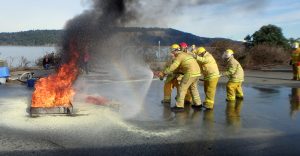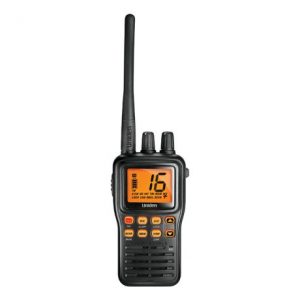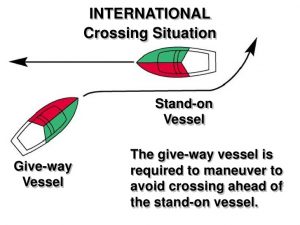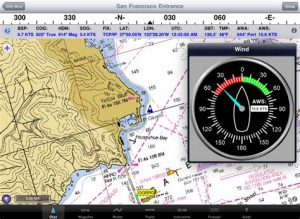Certification and Ticket Requirements
Small Vessel Operator
Small Vessel Operator
For small commercial vessels of either:
- Work Boats and Passenger Vessels of up to 5 gross tons (up to 8.5 meters in length) and carrying up to 12 passengers, or
- Commercial Fishing Vessels of up to 15 Gross Tons (up to 12 meters in length)
This ticket is commonly used by operators of Whale Watching RHIBs, Water Taxis, small Research Vessels, small Trollers, small Gillnetters, small Crab Boats, Crew Boats, etc..
You will need to take and pass the following exams and courses:
- Small Vessel Operator Proficiency
- Marine Emergency Duties: SDV-BS Basic Safety Training
- VHF Radio operator ROC-M
- Marine Basic First Aid – St. John’s Ambulance or Red Cross
To book a course or if you have any questions, feel free to Contact Us.
**Note: We have received many questions about proposed changes to the Marine Personnel Regulations and the SVOP program.
There are proposed changes to the Marine Personnel Regulations which would allow some certified Small Vessel Operators to work on larger vessels. These changes would vary depending on your type of operation. The changes would be primarily for new applicants looking to become Small Vessel Operators. For existing applicants, there will be options for receiving these upgrades to your ticket based on sea-time and experience or by taking an additional day of training with us, this would give you an extension from 5 GT to 15 GT (8.5 – 12 m.).
Current SVOP:
Work and Passenger vessels (max. 12 passengers) of up to 5 Gross Tonnage (8.5 meters),
and for Commercial Fishing vessels only, up to 15 Gross Tonnage (or 12 meters in length),
Limited to operating in Sheltered Waters or Near Coastal Class 2 Waters (within 25 nautical miles of shore).
There is no existing SVOP certification for tugboats or towing operations.
Proposed changes to the SVO program:
The proposed SVO Certificate will be valid for:
-Passenger vessels of up 12 meters, with a maximum of 12 passengers
-Fishing vessels of 15 Gross Tonnage or 12 meters, with an extension of up to 50 miles from shore.
-New addition of Tugboats or Towing Vessels of up to 12 meters (your towing SVO certificate will be limited to specific vessels and areas that you have experience in)
The new proposed SVO training program will consist of different 4 course modules:
Basic SVO Module: 4-day (32 hours) training course
Passenger Vessel Module: 6-hour training course
Fishing Vessel Module: 6-hour training course
Towing Vessel Module: 6-hour training curse, plus 2 months of sea service (as deckhand)
Master Limited, 60 Gross Tonnage and less.
Master Limited, up to 60 Gross Tons
The Master Limited certification is intended for people working a single vessel, or a specific type of vessel. As alluded to in the name it is a limited ticket. A candidate can be limited to a specific vessel, a specific operating area, or a specific type of operation. The Transport Canada examiner who conducts your oral seamanship exam, based on your answers, experience and seatime can add any restrictions he sees fit onto your ticket.
If you change vessels or companies, you may need to prove seatime on your new vessel, or in any new area before being given approval for that new vessel.
To get this certificate you will need to take and pass the following courses:
- Domestic Vessel Safety
- ROC-M or ROC-MC
- SVOP **(only if you are operating small tenders with passengers to/from the primary vessel)**
- Marine Basic First Aid – We recommend ABCB First Aid in Nanaimo, BC, or you can try St. John’s Ambulance or Red Cross
You will also need to take and pass the following courses with us, or challenge the following exams at TC:
You will also need:
- 60 days of commercial seatime on the vessel (or a vessel very similar to the one) you wish to work on. Your seatime will have to be signed off on by the certified master you operated under. Plus, the seatime should be applicable to the type of work you will be doing with your ticket.
- Pass a marine medical exam
- Pass a in-person Oral Seamanship Exam at Transport Canada
On some vessel you also need a engineering certificate like SVMO: Small Vessel Machinery Operator
The Oral Exam can be challenging, because it may cover any of the topics or theory for the above courses, but can also cover any other topic that the examiner thinks a master may need to be aware of for the safety of the vessel.
You can book an Oral Exam Prep course with us
Or, you can study the following material:
- The Canada Shipping Act (2001)
- Pollution Prevention Regulations
- Emergency Procedures (fire, collision, MOB, grounding, etc..)
- Maneuvering and Ship Handling theory
- Basic Vessel Stability
- Weather Forecasts & Basic Meteorology
- Your ships’ Electrical and Machinery Systems
- Passenger Safety Management
- Cargo Loading
- Refueling Procedures
- Small Vessel Compliance Program
- Small Vessel Regulations
- Navigation Safety Regulations (2020)
To book a course or if you have any questions, feel free to Contact Us.
Fishing Master 4
Fishing Master 4
Allows the holder to operate Commercial Fishing vessels of up to 100 Gross Tons, on Sheltered Waters and Near Coastal Class 1 waters.
To get this certificate you will need to take and pass the following courses:
- Domestic Vessel Safety
- ROC-MC
- Marine Advanced First Aid – only at St. John’s Ambulance or Red Cross
- Simulated Electronic Navigation – Limited (SEN-L)
You will also need to take the following courses with us, or challenge the following exams at TC:
You will also need:
- 12 Months of commercial seatime on a fishing vessel
- Pass a marine medical exam
- Pass a in-person Oral Seamanship Exam at Transport Canada.
The Oral Exam can be challenging, because it may cover any of the topics or theory for the above courses, but can also cover any other topic that the examiner thinks a master may need to be aware of for the safety of the vessel.
You can book an Oral Exam Prep course with us
Or, you can study the following material:
- The Canada Shipping Act (2001)
- Pollution Prevention Regulations
- DFO Fishing Regulations for your fishery/industry
- Emergency Procedures (fire, collision, MOB, grounding, etc..)
- Maneuvering and Ship Handling theory
- Stability
- Weather Forecasts & Meteorology
- your ships electrical and machinery systems
- Passenger Safety Management
- Cargo Loading
- Refueling Procedures
- Small Vessel Compliance Program
- Small Vessel Regulations
To book a course or if you have any questions, feel free to Contact Us.
Master 150 GT Domestic
The Master 150 Domestic ticket is the first entry-level “non-limited” certification available and is the next step above the Master Limited 60 GT.
The holder of the “150 Ton” certification can operate vessels up to 150 GT within 25 NM of shore under (Near Coastal 2 voyages).
Additionally, with specific seatime qualifications detailed in our Marine Personnel Requirements, you can obtain a “Limited, Contiguous Waters” endorsement, extending your voyaging range beyond Near Coastal 2 limitations, albeit not reaching the expanse of NC1.
Requirements:
24 months of sea time on a vessel of 5 Gross TOnnage or greater, or 12 months of sea time operating as a Cheif Mate 150 GT.
Applicants must successfully complete the following courses:
- MED STCW Basic Safety
- MED STCW Proficiency in Survival Craft and Rescue Boats (other than Fast Rescue Crfat)
- MED STCW Advanced Fire Fighting
- ROC-MC – Restricted Operator Certificate – Maritime Commercial
- SEN-L – Simulated Electronic Navigation, Limited
- Marine Advanced First Aid
And either pass the following courses or successfully challenge the following written exams:
- CP2 – Chartwork and Pilotage, Level 2
- MET 1 – Meteorology, Level 1
- GSK3 – General Ship Knowledge, Level 3
- NS1 – Navigation Safety, Level 1
- SCS3 – Ship Construction and Stability, Level 3
After completing the prerequisites each applicant must pass an Oral Seamaship Exam.
The Oral Exam can be challenging, because it may cover any of the topics or theories for the above courses, but can also cover any other topic that the examiner thinks a master may need to be aware of for the safety of the vessel.
You can book an Oral Exam Prep course with us
Or, you can study the following material:
- The Canada Shipping Act (2001)
- The various Subordinate regulations to the CSA (2001)
- Pollution Prevention Regulations
- Emergency Procedures (fire, collision, MOB, grounding, etc..)
- Maneuvering and Ship Handling Theory
- Vessel Stability
- Weather Forecasts & Basic Meteorology
- Your ships’ Electrical and Machinery Systems
- Passenger Safety Management
- Cargo Loading and Dry Docking Procedures
- Ship Construction
- Refuelling Procedures
- Navigation Safety Regulations (2020)
- Ship Safety Bulletins
To book a course or if you have any questions, feel free to Contact Us.
Crew / Deckhand
Crew / Deckhand Requierments
To get a job as crew member on a vessel you will need cretin certifications which will depend on the size and type of vessel you wish to work on.
Typical Minimum Requirements are either:
As a deckhand / crew on a vessel of less then 15 tonnes (12 meters)
or for vessels greater then 15 tonnes (12 meters)
Depending on your vessel, company or type of work you may also need the following:
- Small Vessel Operator Proficiency
- VHF Radio ROC-M
- Marine Basic First Aid – only at St. John’s Ambulance or Red Cross
- Small Vessel Machinery Operator
To book a course or if you have any questions, feel free to Contact Us.
Our Courses
Small Vessel Operator
Small Vessel Operator Proficiency 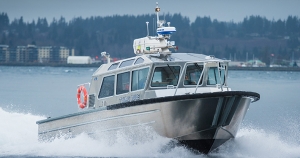
This is a course required for small non-pleasure vessel Operators and crew.
It covers minimum training for owners and operators of commercial vessels:
Workboats and passenger vessels up to 5 GT (~12 meters overall length), carrying up to 12 passenger
and fishing vessels of up to 15 GT,
engaged on a Near Coastal class 2 or a sheltered waters voyage.
Course Goals
To provide:
a) A basic understanding of the hazards of the marine environment and the prevention of shipboard incidents;
b) The knowledge and skills to safely operate a small non-pleasure vessel in near coastal and sheltered waters under normal operating
conditions.
c) Additional knowledge on aids to navigation
In this fun 4-Day classroom-based course we will cover:
- Collision Regulations and Watch-keeping
- Buoyage and Navigation
- Chartwork, Magnetic Compass, GPS, Radar
- Vessel Stability
- Vessel Types and Construction Terminology
- Mechanics and Propulsion Systems
- Docking, Landing, and Maneuvering Theory
- Marine Weather and Forecasting
- Hands-on Knot Tying, Splicing, and Seamanship skills
- Departure Preparations, Checklists, and Safety
Dates/Duration: 26 hours given over 4 days as required by Transport Canad
To operate as a Small Vessel Operator you will also need:
- ROC-M – Radio Course (Restricted operator Certificate – Maritime)
- SDV-BS – MED Course (Small Domestic Vessel – Basic Safety)
- Marine Basic First Aid – only at St. John’s Ambulance or Red Cross
To book a course or if you have any questions, feel free to Contact Us.
Domestic Vessel Safety (MED A1/A2)
Domestic Vessel Safety (DVS)
This is a Marine Emergency Duties safety training course for 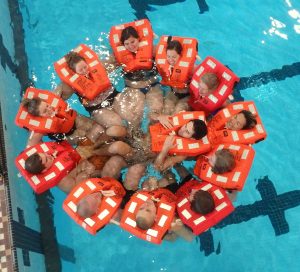
captains & crew of commercial Vessels
This ticket applies to Masters and Crew
operating domestically (within Canada):
– On Near Coastal Class 2 and Sheltered Waters voyages
– On All Commercial Vessels, Specifically:
- Passenger vessels 15 GT and over and/or carrying more than 12 passenger
- Workboats of 15 GT and over
- Fishing Vessels
This course is a mix of classroom theory and real hands-on scenarios. Over a very full and fun 4 days we will cover theories on:
- Types of Emergencies
- Emergency Procedures
- Vessel Stability
- Life Rafts, Survival Suits, and Lifesaving Appliances
- Life Jackets, PFD’s, Worksuits, Floater Coats
- Fire, Extinguishers, Suppression Systems, and Marine Fire Fighting
- Passenger Control, Safety Briefings, and Passenger Safety
- Safety Regulation and Requirements
- Hypothermia and cold water immersion
We will also conduct 2 hands-on field exercises.
One in a swimming pool where we will:
- launch, board, and use a life raft
- use survival suits, PFD’s, and life jackets
- practice recovering a victim from the water
- use life rings, a rescue quest, parbuckles, Jason’s cradle, and a life sling
The other will be a live fire exercise using real fire. We will:
- use 3 different types of fire extinguishers
- practice working in teams to recover a victim from a burning compartment
- and use a fire hose with a combination nozzle
It is a very fun, and super practical and important course for anyone working on the water.
Required Supplies:
- bathing suit
- towel
- boots, or water resistant shoes (recommended)
To work as a Deckhand or Crew you may also need the following: (depending on the type of work, # of passengers, and area of operatio)
- ROC-M – Radio Course (Restricted operator Certificate – Maritime)
- SVOP – Small Vessel Captain (Small Vessel Operator Proficiency)
- Marine Basic First Aid – only at St. John’s Ambulance or Red Cross
To operate as a Master Limited 60 GT, you also need:
- Chartwork & Pilotage 1
- Navigation Safety 1
- ROC-M or ROC-MC
- SVOP (only if you are operating small tenders with passengers to/from the primary vessel)
- Marine Basic First Aid – only at St. John’s Ambulance or Red Cross
To operate as a Fishing Master 4, you also need:
- Chartwork & Pilotage 1
- Navigation Safety 1
- Simulated Electronic Navigation – Limited
- Ship Construction & Stability 1
- ROC-MC
- SVOP (only if you are operating small tenders with passengers to/from the primary vessel)
- Marine Advanced First Aid – only at St. John’s Ambulance or Red Cross
To book a course or if you have any questions, feel free to Contact Us.
SDV-BS - Small Domestic Vessel Basic Safety (MED A3)
SDV-BS – Small Domestic Vessel Basic Safety
This is a Marine Emergency Duties boating safety course. It is the minimum training requirement for masters and crew on small non-pleasure (commercial) vessels. In this intense 1-Day course we will talk about the different kinds of emergencies we may face while working on the water, and what we have to do to keep our crew, passengers, and ourselves safe.
This ticket applies to Captains and Crew Members on Commercial (non-Pleasure) Vessels:
- 24 meters or less engaged on a sheltered waters voyage only;
- 18 meters or less engaged on a voyage in domestic waters only; and
- Fishing vessel of 24 meters or less engaged on a voyage in domestic waters only
We will cover:
- Types of Emergencies
- Emergency Response
- Ship Stability
- Life rafts, Survival Suits, and other Lifesaving Appliances
- Marine Fire Fighting
- Hypothermia and cold-water immersion
- Distress Signals, GMDSS, VHF Radio, EPIRBs, and SARTs
- The Coast Guard and other rescue resources
To operate as a Small Vessel Operator, you also need:
- ROC-M – Radio Course (Restricted operator Certificate – Maritime)
- SVOP – Small Vessel Captain (Small Vessel Operator Proficiency)
- Marine Basic First Aid – only at St. John’s Ambulance or Red Cross
To book a course or if you have any questions, feel free to Contact Us.
ROC-M
Restricted Operator Certificate – Maritime
Masters and Crew
on pleasure and/or commercial vessels
operating in Canadian waters, within 25 miles of shore
a VHF Radio is one of the most vital pieces of safety equipment on your vessel. In this course we will cover:
- the use of a VHF Marine Radio
- Digital Selective Calling (DSC)
- Emergency Broadcasts and Alerts
- Sending a Distress or Priority message
- Radio procedures
- Phonetic Alphabet
- Weather Radio Broadcasts and frequencies
- (GMDSS) Global Maritime Distress and Safety System, which includes DSC/VHF, EPIRBs and SARTs.
This is required for SVOP, Master Limited 60 GT, and most deckhands.
To book a course or if you have any questions, feel free to Contact Us.
ROC-MC (Maritime Commercial)
Restricted Operator Certificate – Maritime Commercial (ROC-MC)
In this course we will cover:
- the use of a VHF Marine Radio
- Digital Selective Calling (DSC)
- Emergency Broadcasts and Alerts
- Sending a Distress or Priority message
- Radio procedures
- Phonetic Alphabet
- Weather Radio Broadcasts and frequencies
- (GMDSS) Global Maritime Distress and Safety System, which includes DSC/VHF, EPIRBs, and SARTs.
- Vessel Traffic Services and Commercial Traffic Call-in Point
- Basic Chartwork, Plotting ETAs to call-in points, or vessels in distress.
This radio operator course is approved by Industry Canada (Spectrum Management).
Anyone using a VHF, on vessels that are required by law to be fitted with a radiotelephone, is required to hold a ROC-MC.
“A ship shall be equipped with one non-portable VHF radiotelephone if
the ship is of closed construction ship of more than 8 m (26.25ft) in length, and /or
a ship carrying passengers,
that is engaged on a voyage any part of which is – in a VHF coverage area, or – more than five miles
from shore; or
-a tow-boat.”
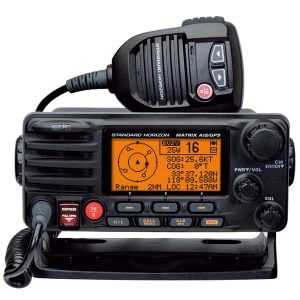
To book a course or if you have any questions, feel free to Contact Us.
Chartwork & Pilotage, Level 1 (CP1)
Chartwork & Pilotage, Level 1 (CP1)
The Chartwork & Pilotage Level 1 course is a pre-requisite for: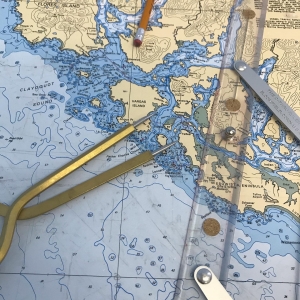
- Master Limited, <60 GT.
- Fishing Master 4
- Mate 150 GT
- Watchkeeping Mate, Fishing Vessel
This is a 12-Day course, it comes in two parts:
Part A: Theory
- Chart Projections, Chart Types, and Distortion
- Nautical Publications
- Log books and Updating Charts & Publications
- Finding Direction, True, Magnetic, Compass, Giro
- Compass Error, Deviation, Variation, TVMDC
- Chart symbols and abbreviations
- The Canadian Buoyage System
- Latitude & Longatude
- Finding a Fix by range, bearing, and depth
- Time, Speed & Distance calculations
- Electronic Navigation and Radio Aids
- Ample time for Practical Hands-On Chartwork
- Review Questions
- Final Exam
In the day of AIS, ARPA, and Integrated Chart-Plotters, people are relying less on paper and visual navigation, therefore it is becoming more important to know what to do if/when these technologies fail. This is a fun, practical hands-on course. We have one of the highest pass rates of any school because we bring in extra instructors for part of this course to ensure that every student, no matter what their experience or knowledge, gets the one-on-one time needed to succeed.
To operate as a Master Limited 60 GT, you also need:
- Domestic Vessel Safety
- Navigation Safety 1
- ROC-M or ROC-MC
- SVOP (only if you are operating small tenders with passengers to/from the primary vessel)
- Marine Basic First Aid – only at St. John’s Ambulance or Red Cross
To operate as a Fishing Master 4, you also need:
- Domestic Vessel Safety
- Navigation Safety 1
- Simulated Electronic Navigation – Limited
- Ship Construction & Stability 1
- ROC-MC
- Marine Advanced First Aid – only at St. John’s Ambulance or Red Cross
To book a course or if you have any questions, feel free to Contact Us. We’re always happy to help.
Navigation Safety, Level 1
Navigation Safety, Level 1 (NS1)
Navigation Safety 1 is primarily based on the International Regulations for the Prevention of Collisions at sea (ColRegs)
- Master Limited, <60 GT.
- Fishing Master 4
- Master 150
We will cover:
- Collision Avoidance and Safe Navigation Practices
- The “Rules of the Road” or Collision Regulations
- Watchkeeping Standards
- Vessel Lights and Signals
- Distress Signals
- Fog and Maneuvering Signals
- Watchkeeping at Night and in Restricted Visibility
This Course covers the TC syllabus for 061 Navigation Safety. It is a prerequisite for a Master Limited 60 Ton and other certificates like Fishing Master-4, Master <150 GT, and others. It is also a good review for anyone wishing to brush up on the ColRegs.
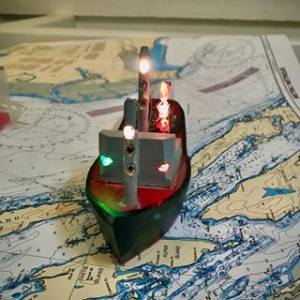
To operate as a Master Limited <60 GT, you also need:
- Domestic Vessel Safety
- Chartwork & Pilotage 1
- ROC-M or ROC-MC
- SVOP (only if you are operating small tenders with passengers to/from the primary vessel)
- Marine Basic First Aid – only at St. John’s Ambulance or Red Cross
To operate as a Fishing Master-4, you also need:
- Domestic Vessel Safety
- Chartwork & Pilotage 1
- Simulated Electronic Navigation – Limited
- Ship Construction & Stability 1
- ROC–MC
- Marine Advanced First Aid – only at St. John’s Ambulance or Red Cross
To book a course or if you have any questions, feel free to Contact Us. We’re always happy to help!
SEN-L - Simulated Electronic Navigation - Limited
Simulated Electronic Navigation – Limited (SEN-L)
Simulated Electronic Navigation Limited is an entry-level Electronic Navigation course.
- Master 150 GT, domestic
- Fishing Master 4
- Mate 150 GT
- Mate 500 GT
You will cover:
- The theory of Range-Based navigation equipment like Loran C, Eco-Sounders, Radar and GPS
- Radar Functions like EBL, ERM, Sea Clutter, Tune, Range, Gain and Frequency
- GPS and Electronic Charts
- Navigating, Watchkeeping, Collision Avoidance, and Running a Course using Electronic Aids
- Rapid Radar Plotting
- Common Errors in Range Based Systems
- Using Simulators and Computer Scenarios to practice these techniques
The simulated electronic navigation courses were developed to address the goals of the International Maritime Organization and parties to the Standards of Training Certification and Watchkeeping Convention, in their desire to promote the safety of life at sea through the training of masters and deck officers in following high standards of watch keeping especially with regard to the application of electronic navigation systems and instruments.
Computer simulation using international classification society approved equipment allows candidates to practice standard operating procedures in the use of engine controls, radar, steering, electronic charts, and the global positioning system. The system was developed with particular attention to blind pilotage for small high-speed vessel
Ship Constrution and Stability, Level 1
Ship Construction & Stability 1 (SCS1)
Ship Construction & Stability 1 is a prerequisite for: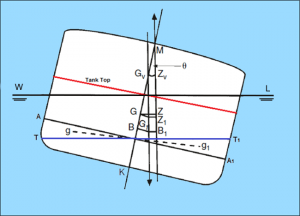
- Fishing Master 4
- A Primer for high-level Stability courses needed for Master 150 and above.
This gives students an overview of ship terminology, hull types, safe handling and loading, and calculating Stability.
You will cover:
- Construction Terminology
- Hull designs and Construction Materials
- Measuring Volume and Lenght
- Displacement, Freeboard, Draft and Reserve Buoyancy
- Understanding Transverse Stability, Righting Leavers, Roll Period, and GM
- Understanding Possible Hazards like Free Surface Effect, Loll, List, and Heel
- Understanding Stability Books and Documents on Ships
- Vessel Modifications, Watertight Hatches, and Fishing Operations
- Environmental Effects on Stability
- Calculating Righting Leavers, TPC, GM, Moments of Force
- Understanding how to maintain Vessel Stability
The SCS1 course prepares candidates to write the Transport Canada exam SCS 1. It is also an introduction to the syllabus for higher level stability and related exams.
Although it is not required, we recommend students who have difficulties with math review a little basic algebra before this course. Here are some free online math and algebra courses to try: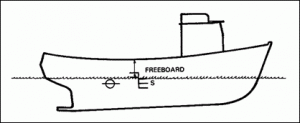
To operate as a Fishing Master 4, you also need:
- Domestic Vessel Safety
- Navigation Safety 1
- Chartwork & Pilotage 1
- Simulated Electronic Navigation – Limited
- ROC-MC
- Marine Advanced First Aid – only at St. John’s Ambulance or Red Cross
To book a course or if you have any questions, feel free to Contact Us. We’re always happy to help!
Chartwork and Pilotage, Level 2
Chartwork & Pilotage, Level 2 (CP2)
The Chartwork & Pilotage Level 2 course is a pre-requisite for:
- Master 150, Domestic
- Fishing Master 3
- Mate 500 GT, Domestic
- Watchkeeping Mate, Domestic
You must take Chartwork & Pilotage Level 1 (Part A & B) with us, before taking this course.
This is a 12-Day course, it comes in two parts:
Part C: Review of Part A & B, plus new Theory
- Chart Projections, Chart Types, and Distortion
- Nautical Publications
- Log books and Updating Charts & Publications
- Finding Direction, True, Magnetic, Compass, Giro
- Compass Error, Deviation, Variation, TVMDC
- Chart symbols and abbreviations
- The Canadian Buoyage System
- Latitude & Longitude
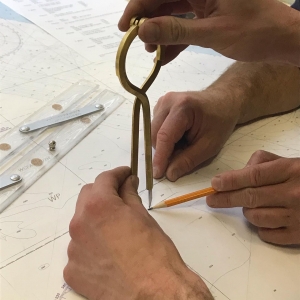
- Finding a Fix by range, bearing, and depth
- Running Fixes
- Calculating Set & Drift, and Allowing for Wind & Current
- Time, Speed & Distance calculations
- Electronic Navigation and Radio Aids
- Determining Compass Error from the Azimuth of the Sun, Basic Astro-Navigation Theory
Part D:
- Ample time for Practical Hands-On Chartwork
- Review Questions
- Final Exam
In the day of AIS, ARPA, and Integrated Chart-Plotters, people are relying less on paper and visual navigation, therefore it is becoming more important to know what to do if/when these technologies fail. This is a fun, practical hands-on course. We have one of the highest pass rates of any school because we bring in extra instructors for part of this course to ensure that every student, no matter what their experience or knowledge, gets the one-on-one time needed to succeed.
To book a course or if you have any questions, feel free to Contact Us.
MED STCW Basic Safety (formerly MED A1 + B2)
STCW Basic Safety
Note: We have submitted to TC for approval, and expect to be offering this course by Fall 2024. We will keep you updated as this process progresses. Once Approved by TC we will start to post specific dates and begin accepting registrations.
To be added to a waiting list and get notifications once we have dates set click Reister Your Interest Now!
Description
This course meets the requirements of TP 4957E and the requirements for Personal Survival Techniques, Basic Firefighting, and Personal Safety and Social Responsibility set out in Table A-VI/1-1, Table A-VI/1-2 and Table A-VI/1-4 of the STCW Code including 2010 Manila amendments.
This is a hands-on Marine Emergency Duties Course that covers a wide range of topics and activities including:
- Types of Marine Emergencies
- Safety Regulations
- Emergency Response
- Distress Signals
- Cold Water Survival
- Life-Saving Appliances
- Rescue from the Water
- Fire Prevention and Fire Fighting
- Equipment Maintenance and Inspection
- Pollution Prevention
- and more…
There are several Hands-On components including:
- Pool sessions for practicing launching inflatable liferafts, lifesaving appliances, and water rescue technique
- Lifeboat launching and operation, using a real lifeboat and a high-tech state-of-the-art lifeboat simulator
- Live Fire Exercises in a land-based ship mock-up where we can deploy controlled fires or smoke, for practical firefighting practice
- CPR and basic First Aid Skills
- And much more…
To be added to a waiting list and get notifications once we have dates set click Reister Your Interest Now!
Prerequisites
- Applicants must be at least 16 years of age.
- Applicants must have a valid TC Marine Medical Certificate or arrange in advance with us a Health and Fitness Waiver before the Firefighting component of the course.
MED STCW Proficiency in Survival craft (formerly MED B1)
MED STCW Proficiency in Survival Craft and Rescue Boats (other than Fast Rescue Craft)
Note: We have submitted to TC for approval, and expect to be offering this course by Fall 2024. We will keep you updated as this process progresses. Once Approved by TC we will be able to post specific dates and begin accepting registrations.
To be added to a Waiting list and get notifications once we have dates set click Reister Your Interest Now!
Description
This course meets the requirements of TP 4957E and Table A-VI/2-1 of the STCW Convention Specification of the minimum standard of competence in Proficiency in Survival Craft and Rescue Boats, other than Fast Rescue Craft.
To enable course participants to learn about, understand and become proficient in:
1) construction and outfit of survival craft and rescue boats and individual items of their
equipment;
2) particular characteristics and facilities of survival craft and rescue boats;
3) various types of devices used to launch survival craft and rescue boats;
4) methods of launching survival craft into a rough sea;
5) methods of recovering survival craft;
6) actions to take after leaving the ship;
7) methods of launching and recovering rescue boats in a rough sea;
8) handling survival craft in rough weather;
9) how to use painter, sea anchor and all other equipment;
10) how to apportion food and water in survival craft;
11) action to take to maximize detectability and location of survival craft;
12) method of helicopter rescue;
13) effects of hypothermia and its prevention, use of protective covers and garments, including immersion suits and thermal protective aids
14) use of rescue boats and motor lifeboats for marshalling liferafts and rescue of survivors and persons in the sea;
15) beaching survival craft;
16) methods of starting and operating a survival craft engine and its accessories together with
how to use the fire extinguisher provided;
17) radio lifesaving appliances carried in survival craft, including satellite EPIRBs and
SARTs;
18) pyrotechnic distress signals;
19) how to use first-aid and resuscitation techniques;
20) managing injured persons, including how to control bleeding and shock.
To be added to a Waiting list and get notifications once we have dates set click Reister Your Interest Now!
Prerequisites
1) A person must be at least 16 years of age to take the PSC course.
2) The person must hold a valid MED DVS (MED A1 or A2) or STCW Basic Safety training certificate.
MED STCW Advanced Fire Fighting (formerly MED B2 + C)
MED STCW – Advanced Fire Fighting
Note: We have submitted to TC for approval, and expect to be offering this course by Fall 2024. We will keep you updated as this process progresses. Once Approved by TC we will be able to post specific dates and begin accepting registrations.
To be added to a Waiting list and get notifications once we have dates set click Reister Your Interest Now!
Description
This course meets the requirements of TP 4957E and the STCW Code Table A-VI/3, Advanced Fire Fighting.
This course is a mix of classroom theory and hands-on training designed for officers and the leaders of fire control teams during shipboard fire incidents. The hands-on parts include Live Fire Exercises in a land-based ship mock-up where we can deploy controlled fires and/or smoke, for practical firefighting practice simulating the real conditions faced on a ship.
Course Goals:
To enable course participants to learn about, understand and become proficient in:
- fire fighting procedures at sea and in port with particular emphasis on organization, tactics and command;
- use of water for fire-extinguishing, the effect on ship stability, precautions and corrective procedures;
- communication and coordination during fire fighting operations;
- ventilation control, including smoke extraction;
- control of fuel and electrical systems;
- fire fighting process hazards (dry distillation, chemical reactions, boiler uptake fires, etc.);
- fire fighting involving dangerous goods;
- fire precautions and hazards associated with storing and handling materials (paints, etc.);
- managing and controlling injured persons;
- procedures for co-ordination with shore-based firefighters;
- preparing contingency plans;
- composition of fire parties and allocation of personnel to fire parties;
- strategies and tactics for controlling fires in various parts of the ship;
- fire-detection systems;
- fixed fire-extinguishing systems;
- portable and mobile fire-extinguishing equipment, including appliances, pumps and rescue, salvage, life-support, personal protective and communication equipment;
- requirements for statutory and classification societies;
- assessing the cause of incidents involving fire.
Prerequisites
- Applicants must be at least 16 years of age.
- Applicants must have a valid TC Marine Medical Certificate or arrange in advance with us a Health and Fitness Waiver
- a person must hold a training certificate in STCW Basic Safety
To be added to a Waiting list and get notifications once we have dates set click Reister Your Interest Now!

